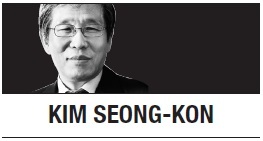
A few weeks ago, I flew to Warsaw to deliver a lecture at the University of Warsaw.
As I had anticipated, Polish students, unlike their Korean counterparts, were eager to learn and full of intellectual curiosity. I talked for 1 1/2 hours and yet no one fell asleep or left the lecture hall in the middle. Nobody was texting or checking Facebook either. Polish students were radically different from Korean students who are infatuated with their smartphones. Moreover, I was greatly impressed when I heard that they showed up voluntarily.
Another impressive thing was the innocence of the Polish people. When I entered a small souvenir shop in Warsaw, I found a pretty amber necklace. Since I had heard amber was an indigenous Polish product, I decided to buy it as a memento. When I brought the necklace to the cashier, the young saleswoman kindly told me, “I can put it aside for you so you can go to other stores to compare and come back later, if you still want it.” She was not tainted by capitalism yet! Otherwise, she would have said, “If you go to other stores to compare the price and come back later, this necklace will be gone already, sold to another customer. So you should buy it now.”
Like Korea, Poland has been through relentless political turmoil. By 1918, Poland was divided by Austria-Hungary, Germany and Russia. In 1919, Poland’s independence was officially approved through the Treaty of Versailles of June 1919. My Polish guide told me that the Polish people were happy only for two decades from 1919 to 1939 until World War II broke out.
During World War II, Nazi Germany bombarded Warsaw and destroyed 85 percent of the city. The Poles went through the atrocities of war for six years, until 1945 when Germany finally surrendered. Yet the ordeal of the Polish people did not end. The Soviet troops took over this time, turning Poland into a communist country. With communism in the eastern bloc collapsing in the early 1990s following the dissolution of the Soviet Union, the last Russian troops left Poland in 1993. Poland regained its freedom at last.
During World War II, Poland was devastated by Nazi Germany’s ruthless tyranny and massacres. History tells us that quite a few Polish people were sent to concentration camps together with the Jews and killed there. William Styron’s novel, “Sophie’s Choice,” aptly depicts the predicaments the Polish people faced at that time. Sophie Zawistowski, a Polish woman, is arrested by the Nazi and then sent to the Auschwitz concentration camp with her two children, even though she is not a Jew. At the camp, Sophie is forced to choose which one of her children would be sent to the gas chamber and which one would live in the camp. She has to make a heart-rending decision to choose her son Jan over her 7-year-old daughter Eva. Later, she loses her son too. The psychological trauma leaves her filled with a guilt that she cannot overcome. While living in New York City, Sophie is still depressed and in mourning. Finally she commits suicide.
Despite its turbulent history, Poland has produced internationally well-known celebrities such as Chopin, Madame Curie, Pope John Paul II, Jerzy Kosinski, and Lech Walesa, among the best in the fields of music, science, religion, literature, and the labor movement. Due to Poland’s difficult situation, however, Chopin, Curie and Kosinski had to leave their homeland and live in other countries. Walesa remained in Poland, but he had to strive for workers’ rights by leading the Polish trade union called Solidarity.
During my sojourn in Warsaw, I visited the Museum of History of Polish Jews and pondered solemnly on the Holocaust and Sophie’s choice. While strolling around the Old Town, I saw vestiges of the glorious past of Poland. Roaming in the city center, I saw towering capitalist skyscrapers and socialist apartment complexes, peacefully co-existing, vividly reflecting the turbulent Polish history.
As I wandered around the streets of Warsaw, brooding on the past ordeals of the Poles, I thought of the fate of my own country, which is similar to Poland in many ways. I thought of Sophie’s choice as well. Surrounded by aggressive, hostile nations, what choices has Korea had so far? Whatever we choose in the whirlpool of international politics, we will still be caught in a political dilemma.
For example, if US President Donald Trump is persuaded by the North Korean leader, who would definitely take advantage of the innocence of the former, to sign a so-called peace treaty, he would have to pull out American troops from the Korean Peninsula. Then the United States would lose a precious ally, as South Korea is likely to fall into the wrong hands.
At least the sky in Poland was cobalt blue and filled with pleasant, fresh air. Leaving Warsaw for Seoul, a city covered with nebulous clouds and toxic micro dust coming from China, I felt a heaviness in my chest.
By Kim Seong-kon
Kim Seong-kon is a professor emeritus of English at Seoul National University and president of the Literature Translation Institute of Korea. He can be reached at sukim@snu.ac.kr. -- Ed.








